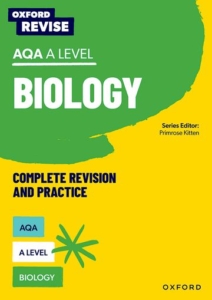Oxford Revise Guides for Students
Oxford University Press created a range of revision guides for students studying for GCSE and A levels. We were given the opportunity to ask a few questions about these guides!


1. Tell us about the revision guides you have created?
Oxford Revise is a new series of revision guides for GCSE and A Level that is informed by the Cognitive Science principles of how knowledge is learned and retained, enabling students to revise effectively with the confidence that they will be able to recall the right information and get the best result they can. Knowledge – Retrieval – Practice in combination represents a proven three-step strategy designed to help students commit large amounts of information to memory, retrieve it and then apply it in their exams.
Every revision guide follows this clear three step approach:
Also, any school in England that places an order directly from OUP will receive 20% of all English Language and Maths Oxford Revise for free. This will enable teachers to give the guides to those students they feel it would benefit most, helping to further revision equity.
2. Why do you feel these are so necessary and how do you hope they will be received by students and families?
There’s a lot to learn for GCSE and A Level exams, and the specification is often covered over a long period of time in schools. When revision season comes around, students will need to return to topics that they may have been taught in a previous year, and they may be anxious about how much they remember. It’s important therefore that they find a revision guide that covers everything they need to know for their exams, and that helps them to check that they have retained this knowledge. Oxford Revise covers the full exam specification in manageable chunks, so that students can revise a topic and check that they can recall that knowledge before taking on the practice questions.
In addition, students can also experience a sense of overwhelm when opening some revision guides at the amount of knowledge they need to revise. Oxford Revise has been created using the principles of learning design so that all the topic knowledge is clearly presented to avoid cognitive overload. The Knowledge Organisers present the information in boxes, and show the relationship between the different chunks of information on the page. Information is presented as visually as possible, using dual coding to aid retention. Many students have commented on opening the books that they look accessible and achievable.
However, a revision guide should do more than simply present what students need to revise. It needs to provide them with the tools to check their knowledge, revisit prior learning, and practice so that they have confidence that they can deploy the right strategies to answer questions in their exam. Oxford Revise does all of this, and we’re delighted to hear feedback from students and teachers highlighting how the guides are easy to navigate, confidence-inspiring and comprehensive.
“Concise summaries of each topic with key arguments. The layout also makes it easier for students to access the material and revise. Excellent retrieval sections so that students can test themselves as they are learning the content.
Key terms are explained and highlighted to help students. Excellent quotations for students aiming to access higher levels and demonstrate their knowledge in the exam. There are also exam-based practice questions with useful tips. This book will help so many of our students and help provide a structure for our revision lessons.”
Sahara, RS teacher
We also have a dedicated website with a host of free resources including a revision planner, top tips, articles and more atwww.oxfordrevise.com
3. What do you feel are the best revision techniques for students?
Checking knowledge is crucial. Many students revise by reading over and over what they need to know, but it’s the act of retrieving that information that will lock it into their long-term memory. By bringing learned information to the mind, the retrieval and storage of that information is strengthened as it is moved from the short- term memory to the long-term memory. That’s why we follow up our Knowledge Organisers with a set of Retrieval questions to challenge students. Can they cover up the answers and recall all of them? If there are any questions they can’t answer, they are prompted to return to the Knowledge Organiser and continue until they can answer all the questions.
We recommend that students revise for their exams as they go through their academic year, rather than leaving it to the last minute. it’s important that they regularly revisit what they have already revised, so that they combat the forgetting curve. Memories weaken over time, so by revisiting the same knowledge again students can reduce the rate at which they typically forget it. Every time a student revisits and recalls prior learning they are reinforcing their memory and the rate of decline of forgetting reduces. That’s why we have included retrieval questions from previous sections in our Retrieval pages on Oxford Revise.
Teachers will often advise that the best way to revise is to practise, and this is true. Cognitive Science research has shown that regular and spaced practice helps students to develop mastery of a topic. By practicing exam-style questions, students are going to be familiar with what they will encounter in their exam and build up the strategies they need to answer the questions. That’s why Oxford Revise contains so much practice – we call it SLOP (Shed Loads Of Practice).
Finally, we recommend both spaced and interleaved learning. Students will be revising for multiple subjectsand it can be overwhelming for them to plan their revision timetable. If they revise one subject for too long, they might suffer revision fatigue, or struggle with cognitive overload. It is much better for them to plan short revision sessions, interleaving different subjects, and spacing out their learning with a plan to revisit what they have already revised. Revision sessions are planned out for students in Oxford Revise, so that they can complete the Knowledge – Retrieval – Practice sections of a topic or sub-topic in approximately one hour.
Try them out! Schools and families can help students by quizzing them on the retrieval questions, as well as helping them to review their answers to the exam-style practice by looking at the answers together (all the answers are accessed via a QR code in the book, or by going to www.oxfordrevise.com). The website also has further support for both students and families.
We also advise families and schools to buy revision guides early. Regular revision will prepare students well for their exams, build their confidence and combat the forgetting curve.
We have a plan to measure the impact of these guides through talking to students and teachers, and gathering evidence of how students are using the revision guides, how confident they feel about their exams in the lead up to their exams, as well as reporting how well they felt they were able to recall the necessary knowledge in their exams. We will be working on this impact study over a period of time and will report our findings. Here is some early feedback:
“Absolute game changer!”
Science Teacher, UK
“Managed to jump up 4 grades from this book. Totally recommend it. Life saver with plenty of exam questions and materials inside.”
Amazon review
“Good revision book. The layout of information is good and has plenty of exam questions for you to practice would recommend!”
Amazon review
Oxford Revise Guides are available from the following website




